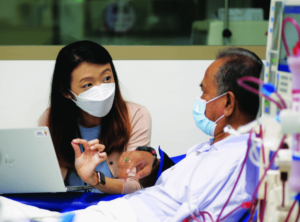“A tough but fulfilling job”
Social worker, Ms Melissa Tan, spends her days walking alongside, and connecting with, dialysis patients and their families who face many daunting challenges due to a debilitating disease – kidney failure. Here, she reflects on the challenges she faces in helping patients who are not having their best days in life, and shares her joys and heartbreaks in this chosen, yet demanding profession.
“Being a social worker indeed gives me the privilege to help patients and their families navigate through tough decisions and impact their lives in a positive way.“
My inspiration
I grew up with my parents always telling me to help others within my limits and educating me that ‘Helping is a Virtue’. And my late father’s medical social worker made me certain that I wanted to be like her. She was my inspiration and that led me to be a social worker and uphold the values that I strongly believe in – of having compassion and perseverance.
Daily work and challenges

I help patients on the road to rebuild their lives. I journey with patients and their families, provide psychosocial assessment and counselling, connect patients to community resources and organise group work programmes to promote their social well-being. I work hand in hand with the multidisciplinary team of medical and allied health professionals to educate and influence patients to improve their quality of life and daily functioning, and empower them to take ownership of their treatment by coming up with an individualised care plan, as every patient’s condition is different.
There are patients who do not open up to social workers, not wanting to acknowledge our presence, let alone share their problems with us. There are times when I even get shouted at. There is also the language barrier, as different patients speak different languages or dialects. Patients’ and family members’ perspectives may also differ, and that is when I will have to end the session and revisit them after some time. Human relationships are important, and I treat patients as friends and strive to know them as a person before I understand their issues.
Helping patients during Covid
The pandemic has been a very trying time for dialysis patients, especially as they are more vulnerable to the virus due to their weaker immune systems. I will do daily check-ins with patients and their families via tele-commuting to ensure that they are coping well, educate them on safety and hygiene, and assure them that they are not alone during these difficult times.
An unforgettable experience
A vivid encounter that is etched in my mind was one of an elderly dialysis patient who suffered from dementia and had bilateral lower limb weakness. She had an estranged relationship with her only daughter from her first marriage and, during her lucid days, she shared that she wished to reconnect with her daughter. Upon knowing that her days were numbered, her second husband and I hoped to fulfil her wish and started reaching out to her daughter. Her daughter eventually visited her mother at the hospital before her passing. Helping to bring about a reconciliation between mother and daughter gave me an inner sense of fulfilment.
Self-care to care better for others
There are times when I do feel disheartened in coping with challenges, but ultimately, I am still human. In times like these, removing myself from the situation for a while is helpful as I can re-energise to better care for others. During this short downtime, I will either go for a run to clear my mind or pour my heart out to my family members, close friends or colleagues. Their opinions and suggestions provide me with different perspectives, which helps me manage my expectations. In this profession of caring for people, I am also prone to burnouts. While I still find myself having to think about work and checking emails after working hours or during weekends, I remind myself to spend quality time with my family, especially with my baby, so as not to miss out on any of his milestones.
Deeply rewarding
Being a social worker indeed gives me the privilege to help patients and their families navigate through tough decisions and impact their lives in a positive way. I feel appreciated when patients thank me. While it is often difficult work, it is truly meaningful and fulfilling. As long as I have done my best, that is good enough for me.

